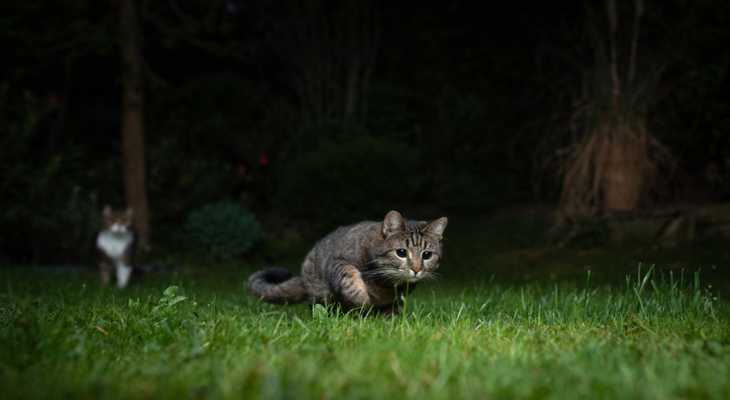
Tips to Keep Your Cat Calm During the Night
If you live with a cat, you've probably been woken by the sound of thundering paws as your pet makes a mad dash through your home. Although the feline frenzy may be amusing when you're awake, things are a little different when your pet knocks over a lamp as you're trying to sleep. If you're exhausted by your cat's midnight antics, a few of these tips may help restore peace to your home in the evening.
Help Your Pet Release Extra Energy
You may have been busy during the day, but your cat's day was full of long naps and bird watching. Unfortunately, once the sun goes down, your pet may decide it's the perfect time to get rid of excess energy.
Although many people believe that cats are nocturnal, felines are actually crepuscular, or more active at dusk and dawn. The more active your pet is during the day, the less energy it will have for pre-dawn, high-speed marathons over your sleeping body.
Games offer the perfect way to tire out your pet. Encourage your favorite feline to bat a dangling toy at the end of a kitty fishing rod, fetch a small toy, or chase a laser beam.
If you're away from home during the day, provide toys that will keep your cat busy. Pet supply companies offer plenty of options from dangling toy mice that hang from the door jamb to climbing structures to laser toys your cat can activate with a swipe of the paw.
Make a Change to Mealtime
Hunger could be one of the reasons your pet is so active in the evening. PetMD notes that cats often sleep after eating and recommends offering a small meal before you go to bed.
Of course, offering extra food could increase your pet's weight. Luckily, you can prevent weight gain by slightly reducing the amount you feed your pet for dinner.
Does your cat insist that you serve breakfast at 5 a.m.? Adding a timed pet food dispenser to your kitchen may solve the problem. Your cat will be less likely to disturb your sleep once it realizes that the dispenser releases food at the same time every morning. Finding treats hidden throughout your home will also give your pet something to do while you're asleep.
Close the Bedroom Door
Keeping your door closed at night can be a good solution, as long as you're willing to put up with a little complaining until your cat gets used to the new arrangement.
You may be able to distract your pet by offering a selection of interesting toys or even a cardboard box outside your door. Of course, you'll want to choose toys that don't make sounds.
Visit the Veterinarian
If these tips don't help, it's a good idea to schedule a visit with the veterinarian. In some cases, a cat may be more active at night because it's ill or in pain. Does your older cat spend hours meowing during the night? It may be confused due to dementia.
Your veterinarian can determine if a health issue is responsible for your cat's behavior and offer treatments or suggestions that will help everyone in your home get a better night's sleep.
Are you concerned about your cat's nighttime activity level? A trip to the veterinarian will help you ensure that a health problem isn't to blame. Contact our office to make an appointment with the veterinarian.
Sources:
Petfinder: Keeping Your Cat Calm at Night
https://www.petfinder.com/cats-and-kittens/training/general/keep-cat-calm-at-night/
PetMD: How To Get Your Cat to Sleep At Night, 2/2/2022
https://www.petmd.com/cat/general-health/how-get-your-cat-sleep-night
WebMD: Nighttime activity in Cats, 3/16/2023
https://pets.webmd.com/cats/guide/nighttime-activity-cats
Purina: Myth Buster: Are Cats Truly Nocturnal?
https://www.purina.co.uk/articles/cats/behaviour/common-questions/are-cats-nocturnal


